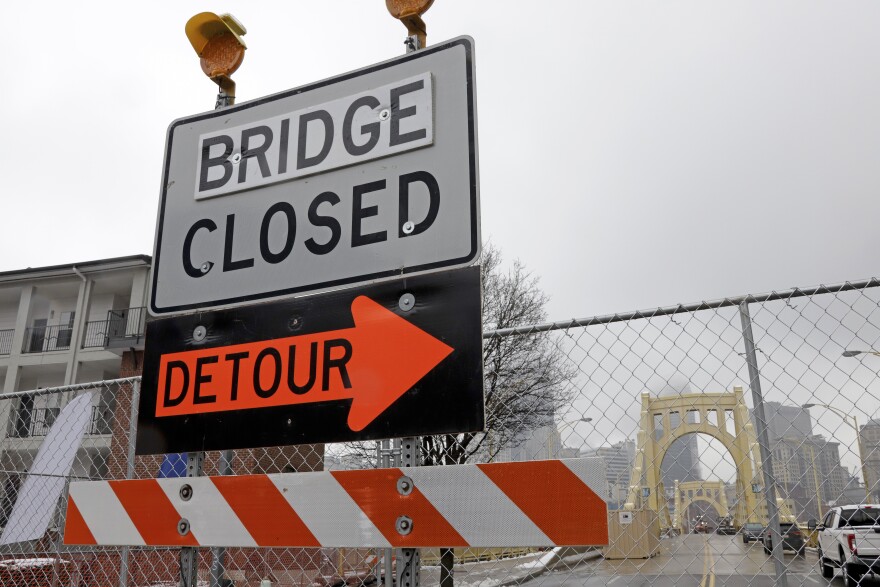On today's program: The vice-chair of the Southwestern Pennsylvania Commission explains the poor state of the region’s infrastructure and how she hopes the Biden administration might help; the president of the city’s Bartender’s Guild says while some are excited about loosened restaurant restrictions, others are more hesitant about returning to work; and a look at what’s changed with policing under the Peduto administration amid calls to defund and add accountability to law enforcement.
One county commissioner says the region’s roads are failing
(0:00 — 7:32)
President Biden will be in Pittsburgh today to promote his $2 trillion plan to rebuild the nation’s infrastructure.
“I think it’s no secret for the Southwest PA region that we have many failing roads and bridges and we’ve struggled just to maintain our infrastructure here,”says Leslie Osche. She’s a Butler County commissioner and vice chair of the Southwestern Pennsylvania Commission, which helps counties and municipalities access and implement infrastructure funding.
“We have probably three pages here of projects that we do not have capacity to fund.”
Osche says the region is overdue for an infrastructure bill. Revenues from gas tax and tolls have dropped in the pandemic, and she says the region needs more stable funding.
The American Society of Civil Engineers rated the nation’s infrastructure and the state’s a ‘C-’ this year. However, the Commonwealth’s roads and bridges have an even worse grade of ‘D+’.
“I think in our southwest region we’re even more challenged,” says Osche of the grade. She says each county of the ten the Southwestern Pennsylvania Commission supports has unique needs, but share similar challenges.
“The need has been so great just to maintain the roadways, and we’ve had to focus so much just on maintenance, there’s been little funding available for expansion that allows for greater economic development.”
Bar and restaurant restrictions loosen Sunday, but not everyone in the food service industry is ready
(7:36 — 13:40)
Sunday, April 4 restaurants and bars will be able to increase their capacity for indoor dining and serve alcohol to customers without food.
This comes as the country is seeing increasing COVID-19 cases and states loosening restrictions, all while the rate of vaccinations is rising.
“Some people are excited to have the opportunity to make money that’s close to what they used to make with increased capacity, but I would say, a lot of people are nervous, and I think rightfully so,” says Amanda Schaffner, president of the Pittsburgh chapter of the U.S. Bartender’s Guild. “Especially given the fact that hospitality workers are technically Group 1C currently and they should be moved up to a higher priority group if we’re gonna open things up a little bit more, and have them interacting with more people that aren’t wearing masks for extended periods of time.”
Since speaking to The Confluence in January when the previous shutdown orders were about to lift, Schaffner changed jobs, moving from behind the bar at DiAnoia’s Eatery to a role as a field sales representative for Great Lakes Brewing.
Schaffner says her career move was not reflective of the pandemic, but she knows of other people who have chosen to leave the industry because of COVID-19.
“[The pandemic] kind of lifted the veil on some greater issues within our industry,” says Schaffner. “Some folks have gone back and understand the risk level with going back to work, and some folks are just saying, ‘You know what? It’s not worth the risk for me right now. I will wait until I’m vaccinated.’”
Schaffner believes as restrictions are lifted, restaurants will continue to struggle. She says many are looking for staff to support increased customer capacity, but employees are grappling with the financial impacts as well.
“There’s no guarantee on what you make, right? Also on the other side of that, for folks who work in the kitchens: Are they gonna be taken care of? What’s the hourly look like, are there benefits?”
Schaffner says she wants to be optimistic the industry can rethink how it treats and pays employees, but it will take a lot of work.
How policing has changed under the Peduto administration
(13:45 — 18:00)
Bill Peduto has sometimes been at odds with both activists and police in his first two terms as Pittsburgh's mayor. As he goes into his reelection bid, he must contend with a year of protests demanding both more accountability and less funding for police.
90.5 WESA’s Ariel Worthy reports that when you look at the numbers, there are signs that policing has begun to change.
The Confluence, where the news comes together, is 90.5 WESA’s daily news program. Tune in weekdays at 9 a.m. to hear newsmakers and innovators take an in-depth look at stories important to the Pittsburgh region. Find more episodes of The Confluence here or wherever you get your podcasts.






